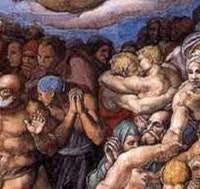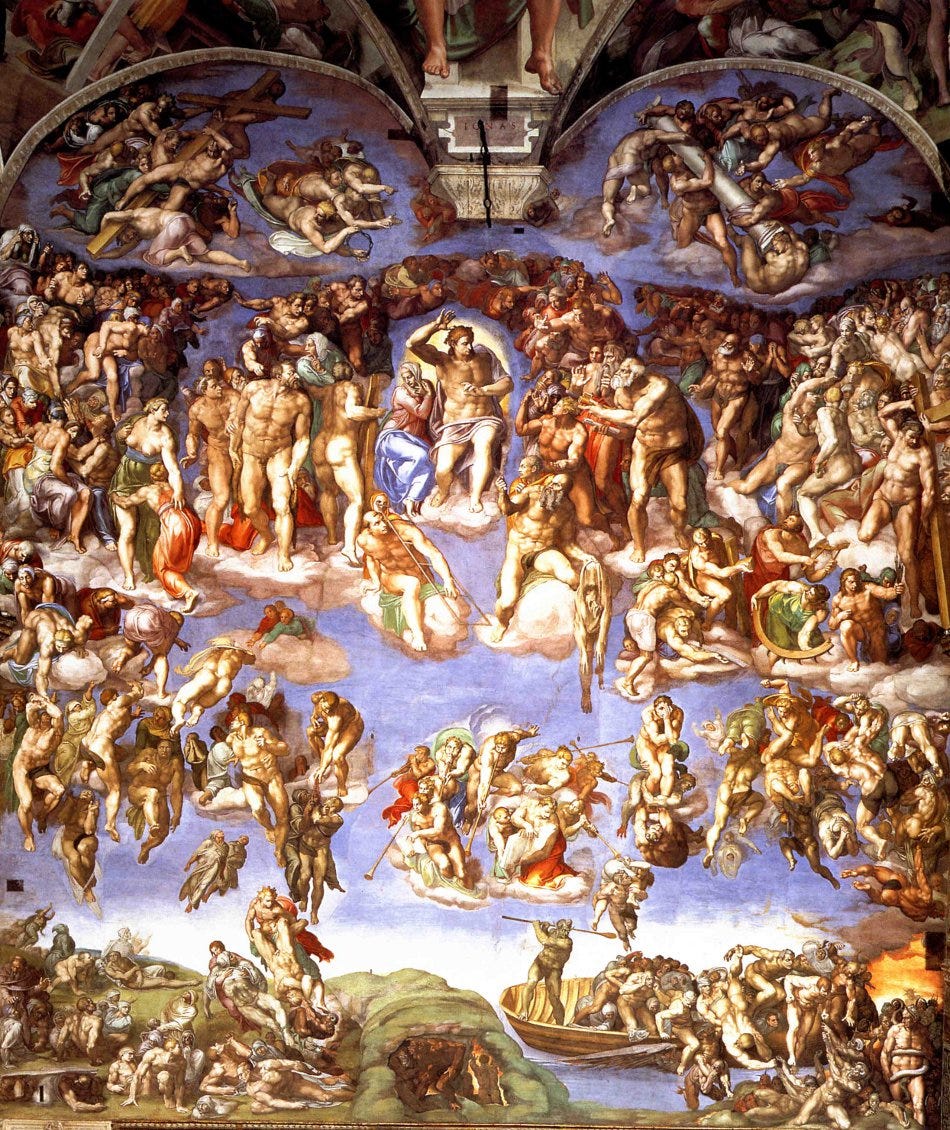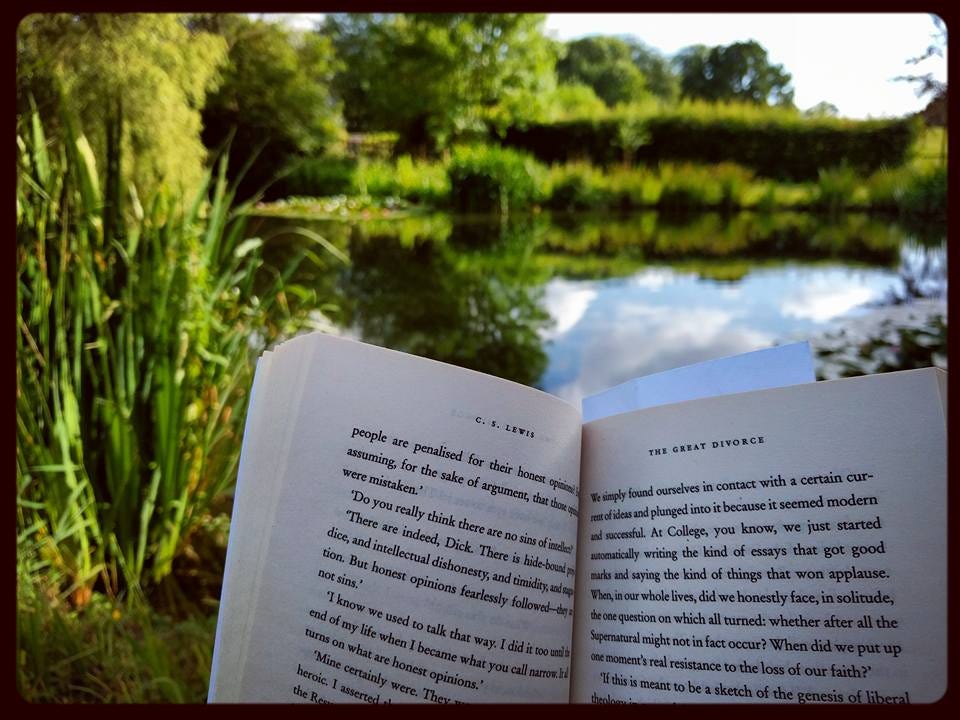Peter Thiel's Religion - David Perell
Human culture began with a murder. That culture was fueled by rage and rivalry, which led to violence. Managing that violence is the secret reason for all religious and political institutions.
In The Bible, The Cain and Abel story is the first act of life after the Garden of Eden. Cain is a farmer and the older brother to Abel, who is a shepherd. Initially, Cain admires Abel. But eventually, when Cain turns envious of his younger and more successful brother, he kills him. The two brothers represent two halves of the human psyche: Abel represents the part that looks up towards the transcendent, where Cain represents the other that looks down towards death and destruction.
Depending on who you ask, the significance of the Cain and Abel story ranges from nothing to everything. For some, the Christian cross is too strange to be taken seriously. It’s archaic and stuck inside a biblical world that can no longer speak to the challenges of life with iPhones, Tinder, and $12 avocado toast. But to others, religion is the foundation of human culture. Without it, peace cannot be maintained and violence will erupt like an angry volcano.
What does Peter Thiel think? Is religion a superfluous add-on or the origin of everything?
In this essay, we’ll explore the significance of religion and the Cain and Abel story. We’ll learn why the story is an archetype for human relationships, even in the Western world where people stiff-arm religion like it’s the Heisman trophy.
We’ll study religion through the lens of Peter Thiel. He’s an investor who found wealth in PayPal, a student who found wisdom in Libertarian ideals, and a philosopher who found faith in the resurrection of Jesus Christ. Thiel was raised as an Evangelical and inherited the Christianity of his parents. But his beliefs are “somewhat heterodox.” In a profile in the New Yorker, Thiel said: “I believe Christianity to be true. I don’t feel a compelling need to convince other people of that.”
Peter Thiel is not a Christian. Peter Thiel is someone who believes religion is important to push on the masses to stop people from murdering one another, but Peter Thiel doesn’t believe in the fundamental tenets of Christianity. Peter Thiel seems to believe the original sin was Cain murdering Abel, and not Adam and Eve disobeying God and eating the forbidden fruit from the Tree of Knowledge of Good and Evil. This is quite clearly not the original sin. I find it amusing that the German term for original sin is Ursünde. That’s not that amusing in and of itself, but in German the prefix Ur- connotes something prototypical or archetypal, and really gained that sense in the Naturphilosophie of Goethe and Schelling, as well as more popularly Jung and his spinoffs discussing psychological archetypes. The prototypical or archetypal sin is simply disobedience to God, not murder. This is extremely ironic since Peter Thiel himself is German, so he should have more resources to understand such an idea than all of us Americans in a de facto Anglophone country.
Thiel’s Intellectual Background
To understand Thiel’s ideas, we need to begin with the person who influenced Peter Thiel more than any other writer: Rene Girard.
Rene Girard was a French historian and literary critic. He’s famous for Mimetic Theory, which forms the bedrock of Thiel’s worldview. Thiel studied under Girard as an undergraduate at Stanford in the late 1980s. Their relationship stretched beyond the walls of Palo Alto classrooms and became a lifelong friendship. When Girard died, Thiel spoke at the memorial service.
Mimetic Theory rests on the assumption that all our cultural behaviors, beginning with the acquisition of language by children are imitative. He sees the world as a theatre of envy, where, like mimes, we imitate other people’s desires. His theory builds upon the kinds of books and people that modern people tend to ignore: The Bible, classic fiction writers such as Marcel Proust, and playwrights like Shakespeare.
Peter Thiel thinks everything everyone does is just an attempt to copy other people. What a normie prep. He also appears to do a fairly good job ignoring the Bible, as seen by the comments I made above, and if he heeds classic literature and plays, then I’m sure that’s just proof his life goal is to model himself on the figure of Mephistopheles from Goethe’s and Marlowe’s Faust. Also being modern is so two historical epochs ago. We’ve already passed postmodernity into post-postmodernity or metamodernity, and everyone seems accordingly rather obsessed with classic literature, playwrights, and the Bible.
When Peter Thiel describes himself as “somewhat heterodox” he might as well mean “a raging blasphemous heretic.” Nothing about Peter Thiel’s beliefs are Christian at all. Peter Thiel said he hates Calvinism for all you Reformed and Presbyterian people. He also hates the Pope, though sedevacantism is not exactly a new ideology in Catholicism and in the context of Dante has been considered to not be inherently heretical, the real problem being that Peter Thiel believes the original sin is Cain murdering Abel, not Adam and Eve disobeying God.
e-arthistory: DANTE's place in Michelangelo's heaven (e-arthistory5.blogspot.com)
Michelangelo's Dante seems to be looking intently at the Old Testament sets of brothers we have discussed in another blog, Cain and Abel embracing, and Esau and Jacob to the right of them with cloak and bared back.
Why does the artist place Dante in heaven and why next to these Old Testament figures? For the first question, the artist acknowledges Dante's greatness as a poet by putting him in heaven with a laurel wreath; Dante is rewarded for his literary genius. Since Michelangelo was a poet, too, he is also perhaps acknowledging his own indebtedness to the earlier Florentine. We have seen Michelangelo's use of Dante's image of the "descending old flesh"("vecchia scindi da te la carne") from Purgatory XI in his own self-portrait in the Last Judgment painting here. But Michelangelo paints Dante in heaven also because Dante writes his own description of heaven in the third part of his famous work, La Divina Commedia. The artist is showing that he has read Dante's Commedia and paints his face as a signpost for the viewer to compare the ways in which he has changed Dante's own view of the afterlife in his pictorial version.
Michelangelo adheres to Dante's ideas in his portrayal of Charon and his boat in Hell in the lower right corner of this painting. But the artist shows no Purgatory on the wall, and he imagines many Biblical enmities resolved in the heavenly realm, something not present in Dante's Paradiso. The artist also knows that Cain as well as Esau and Jacob are mentioned by Dante in his poem by name. Michelangelo's places Dante near these brothers to show the medieval poet how he re-imagines the fates assigned these figures in the Commedia.
Neither Cain and Abel nor Esau and Jacob are spirits that Dante the pilgrim encounters in his voyage to the afterlife. But they are referred to in his major work. Cain is mentioned twice, once in Hell (Inferno Canto XX, line 126) and once in Paradiso (Canto II, line 51). Both times Cain is used as a metaphor for the moon as Dante supposes that Cain was exiled to the moon by God as punishment for the murder of his brother Abel. Esau and Jacob are mentioned in Paradiso, (Canto VIII, lines 130-131), but the brothers are not seen in Heaven, just talked about by the French king, Charles Martel, whom Dante, the pilgrim, does see in Heaven. They are discussed by Dante and Martel as examples of two boys with the same father who emerge from the womb with very different characters.
The fact that Michelangelo paints Cain into heaven, reconciling with the brother he killed, is a new view of God's treatment of Cain.
If Peter Thiel were really serious about taking classical culture seriously, Peter Thiel would be doubly embarrassed to think Cain’s murder of Abel is the Ursünde. Yes, Michelangelo contradicts Dante here. However, he’s not the only one. Another one is an even more popular and influential figure in Christianity: C. S. Lewis.
C.S. Lewis – The Great Divorce – Louise Douglas
The conversation that resonated most with me was one where the ‘visitor’ realises that the heavenly person that had come to meet him was a murderer while he was living on earth. The visitor couldn’t believe that the murderer had made it to heaven, and he was unwilling to go to heaven if this man was there, as he didn’t believe that he belonged in the same place or that the ‘murderer’ should be forgiven. It’s really easy to judge people by their actions, but it’s also really easy to forget that you don’t know their heart or their circumstances. God doesn’t condemn us for bad decisions; as long as we truly repent, we can be forgiven. I think not judging people is much easier said than done, but this was a good reminder that God loves us all the same.
S2E6 - TGD 4 - "I gotta have my rights..." - Pints With Jack
Would C. S. Lewis put the Peter Thiel of today in Hell? One can only speculate, but it doesn’t seem like they’d agree on anything at all, especially since Peter Thiel seems to think the sole purpose of religion is as a so-called “noble lie” to deceive the masses with so they won’t murder people, hence “political theology.” To Peter Thiel, theology is a method of politics and nothing else.
Furthermore, I would think the message of this is that Cain’s murder of Abel wasn’t inspired by mimetic desire for what Abel had anyway, but simply because Cain wanted to be as close to God as Abel was. After all, did Abel have a mimetic desire to be like Cain? No. There is an objective good out there, and that’s what people want for themselves, not simply what other people have. If other people have something objectively bad, there’s generally no desire for that. Sometimes people desire things that are bad for them or other people, but those are because people are misled and those constitute a minority of cases. Usually people don’t see someone chained to the floor of the basement, or starving in a third-world country, or addicted to drugs and homeless, and go like “yeah, I want that because other people have it,” and I think that constitutes the overwhelming majority of things that are bad for people: things that are clearly bad, not things with unintended side effects. People are attracted toward the good, not toward blind mimesis.









Is the same Peter T that owns Palantir and Pay pal?
https://unlimitedhangout.com/2020/12/investigative-series/palantirs-tiberius-race-and-the-public-health-panopticon/
"Palantir Technologies, the company founded by Alex Karp, Peter Thiel, and a handful of their associates, has courted controversy for its supporting role in the US military occupation of Iraq and Afghanistan as well as its participation in the detention of “illegal” immigrants through their contracts with the Department of Homeland Security and in “predictive policing” law enforcement programs that disproportionately affect minority neighborhoods. Equally controversial, but perhaps lesser known, is Palantir’s long-standing and enduring ties to the CIA and intelligence community at large, which was intimately involved in the development of Palantir’s products that now run on the databases of governments and corporations around the world."
These people that have reached the Priest-class of Corporative masking seem to have a mask for every occasion in the world of convenience. Very interesting I have met these people in my travels at the top of the food chain and they barely can function without a dogma or pre-fixed training. Nothing more than well trained lap dogs that run big Corps.
Just my opinion whoopx!
Hebrews 11:4